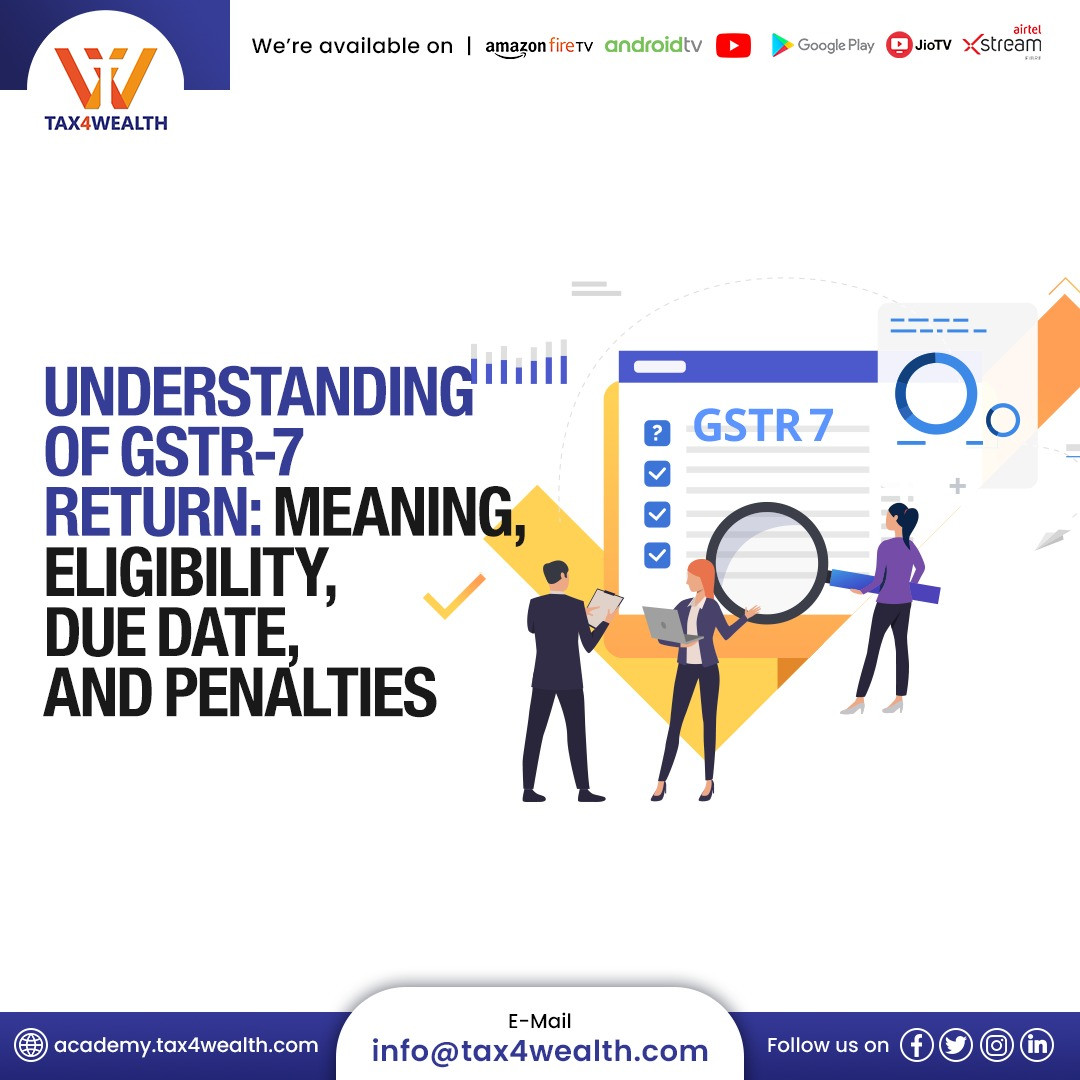
GSTR-7 Return: Meaning, Eligibility, Due Date, and Penalties
In India, the Goods and Services Tax (GST) has revolutionized the taxation system. As part of GST compliance, businesses are required to file various types of returns, one of which is GSTR-7 Return. GSTR-7 is specifically designed for businesses that are required to TDS while making payments to suppliers. In this blog post, we will delve into the meaning of GSTR-7, explore its eligibility criteria, understand its due date, and discuss the penalties associated with non-compliance.
1. Meaning of GSTR-7:
GSTR-7 Return is a monthly return filed by businesses that are required to deduct TDS under the GST regime. It contains details of TDS deducted, TDS liability payable, and other related information. The purpose of this return is to ensure that the TDS deducted by the deductor is correctly reflected in the GST records of the deductee. GSTR-7 acts as a communication channel between the deductor and the tax authorities.
2. Who is eligible to deduct Tax Deducted at Source (TDS) under the Goods and Services Tax (GST) regime?
According to GST laws, the following individuals/entities have the authority to deduct TDS:
✅ Departments or establishments of the Central or state government.
✅ Local authorities.
✅ Governmental agencies.
✅ Persons or categories of persons as notified by the Central or a state government on the recommendations of the Council.
Additionally, as per Notification No. 33/2017 – Central Tax, dated 15th September 2017, the following entities are also eligible to deduct TDS:
✅ Authorities, boards, or any other bodies established by the Parliament, a State Legislature, or a government with 51% equity (control) owned by the government.
✅ Societies established by the Central or any state government, or a local authority, and registered under the Societies Registration Act, of 1860.
✅ Public sector undertakings.
The aforementioned deductors are required to deduct TDS when the total value of supply under a contract exceeds Rs. 2.5 lakh. The TDS rate is 2% (1% CGST + 1% SGST) for intrastate supplies and 2% (IGST) for interstate supplies. However, TDS is not deducted when the supplier's location and the place of supply differ from the recipient's registration place (state).
3. What is the Due Date for Filing the GSTR-7 form?
The due date for filing GSTR-7 is the 10th of the following month for which the return is being filed. For example, the GSTR-7 for the month of June must be filed by the 10th of July. It is crucial to adhere to this deadline to avoid penalties and interest charges.
4. Importance of GSTR-7:
GSTR-7 Return provides information regarding the deducted TDS amount, both paid and payable, as well as any TDS refund claimed. The individual on whom TDS has been deducted (referred to as the deductee) can utilize the TDS amount as Input Tax Credit to settle their output tax liability.
After the deadline for filing Form GSTR-7 has passed, deductees can electronically access the details of the TDS deducted in PART 'C' of Form GSTR-2A. Additionally, the certificate for the deducted TDS will be available in Form GSTR-7A, based on the return filed in GSTR-7.
5. Requirements for GSTR-7:
GSTR-7 Return is a return form filed under the Goods and Services Tax (GST) system in India. It is used to furnish the details of tax deducted at source (TDS) by the taxpayer who is required to deduct TDS.
The following are the details required in GSTR-7:
✅ GSTIN (Goods and Services Tax Identification Number), assigned to the taxpayer.
✅ The legal name of the entity or individual filing the GSTR-7.
✅ The specific month and year for which the return is being filed.
✅ This includes information about the deductee, such as their name, GSTIN (if applicable), and the total amount of TDS deducted.
✅ Information related to the TDS challan, including the challan number, date, and the total amount of TDS deposited.
✅ In case there are any amendments or corrections to be made in the previously reported TDS details, the revised information should be provided.
✅ If there are any applicable interest charges, late fees, or penalties due to delayed or incorrect filing, they should be included in this section.
✅ The GSTR-7 should be signed and verified by an authorized signatory or the taxpayer.
6. Penalties for Non-compliance:
Non-compliance with GSTR-7 filing requirements can result in penalties and interest charges. The penalties for late filing include:
1. Late fee:
A late fee of Rs. 100 per day (Rs. 50 for CGST and Rs. 50 for SGST/UTGST) is charged if the GST return is not filed within the due date. However, the maximum late fee is capped at Rs. 5,000.
2. Interest charges:
In addition to the late fee, interest is levied on the outstanding tax liability. The interest rate is currently set at 18% per annum, calculated on the amount of tax liability from the due date until the actual date of payment.
It is important to note that penalties and interest charges can accumulate over time, increasing the financial burden on the business. Therefore, it is advisable to file GSTR-7 return on time and ensure compliance with all the relevant regulations.
Conclusion:
GSTR-7 is an essential return for businesses that are required to deduct TDS under the GST regime. By understanding its meaning, eligibility criteria, due date, and penalties for non-compliance, businesses can ensure timely and accurate filing, avoiding unnecessary penalties and interest charges. Adhering to the GST regulations not only helps businesses maintain compliance but also contributes to the overall success of the GST system by facilitating seamless communication between the deductor, deductee, and tax authorities. Stay informed, stay compliant, and embrace the benefits of the GST regime.
For more information, Visit us at: https://academy.tax4wealth.com/
Related News
No comments yet, Be the first to comment.













